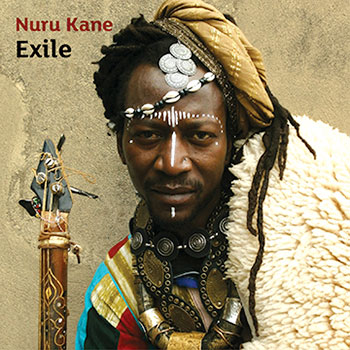Nuru Kane, a Senegalese singer and guitarist, calls his band and musical style Baye Fall Gnawa, or simply BFG, referencing in one breath the religious group to which he belongs (a subgroup of the Islamic Sufi Mouride brotherhood) and a style of traditional trance music from Morocco. “Why is a Senegalese musician playing Moroccan music in France?” you might ask. To which we might reply, “Making an eclectic, Franco-Afro-diasporic fusion album!”
Exile, Kane’s second release on Riverboat Records, is stylistically diverse, sometimes to a fault. The music draws on everything from Senegalese mbalax to flamenco, passing through hip-hop and Gnawa on the way. Perhaps this is due to the range of the artist’s tastes and abilities, but it is worth noting that this album was recorded in France with Theirry Fournel, a French musician who produced and arranged the album and wrote the music for six of the 10 songs (Kane contributed lyrics), also adding guitar, oud, sanza and ngoni to the tracks. As a result, it would be a mistake to underestimate Fournel’s influence on the range of styles and sounds present on the album.
Despite Kane’s Senegalese background, a distinct Malian musical influence can be heard across the album, with most tracks using the characteristic fileh calabash drum, the karignyen metal scraper and ngoni, kora and balafon. This is a fusion, one especially informed by a postcolonial cosmopolitanism, formed as immigrants from across Francophone Africa meet in France and combine musical styles.
Kane’s singing is energetic and dynamic from the first track, “Afrika,” where he first indicates the album's variety as he moves from singing in full voice to rapping in Wolof as balafon and ngoni snake through the mix beneath him. He also delivers haunting quieter songs, such as “Exile,” from which the album takes its name. Beautiful instrumental performances from the violin, ngoni and sanza set up an uneasy bed for Kane’s strong voice.
The Gnawa influence is highlighted in “Bambala” which features Kane’s skillful playing on the three-stringed bass-lute, guimbri, which he learned to play after falling in love with the music on a trip to Morocco. Other elements of the style come out in “Bayil,” which is primarily a loping Afro-pop groove, marked mid-song by the clapping of the characteristic kerkabous cymbals of Gnawa.
While the majority of this album tickles our ears with its mix of sounds, there are a few times when its eclecticism goes to potentially distracting extremes. For example, Kane’s composition “Corriendo,” where the guitars play a flamenco rumba, and Kane sings in a mix of Spanish and Wolof. While the song is a testament to the breadth of his influences, it feels like a stylistic overreach, especially coming on an already eclectic album. Another track which gave us pause is “Yes We Kane,” a ‘gypsy’ jazz manouche tune written featuring chugging guitars, violin and Kane singing in French. With the band shouting,“If anybody Kane, Nuru Kane!” it takes on an almost comedic air of cabaret kitsch, as if it is not to be taken completely seriously. And of course, there is the requisite reggae tune: “Issoire,” in which Kane sings a tribute in English and French to the French town of Issoire. This song is at least less distracting, if not particularly musically interesting.
A more enticing hybrid can be heard on the song “Niang Balo,” which features guitar work that could be from the Mississippi Delta or the Sahara. Fournel makes the oud sound like it would be right at home on the back porch, and Kane’s Wolof lyrics lilt over the strings, following the guitar lines with ease. The album ends on a high-note with "Zikar," a tranquil song, which features somber oud, shimmering kora and a high-lilting female voice answering Kane’s forceful calls.
It takes a few listens of Exile to get beyond simply appreciating the truly eclectic mix of styles, instruments and energies. The more beautiful and lasting songs are there, and this album can provide lasting enjoyment. We are looking forward to hearing more from Nuru Kane and BFG in the future!









